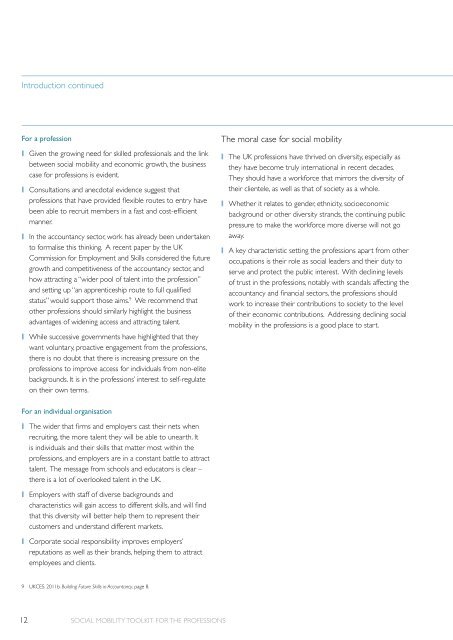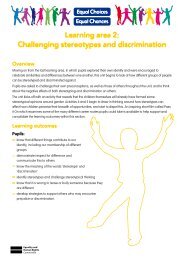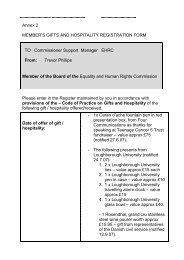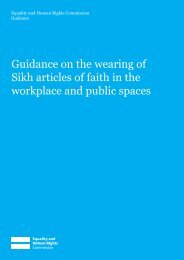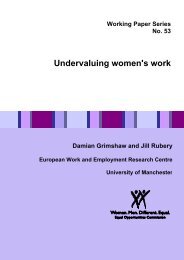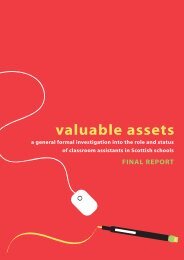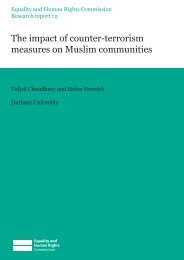Social Mobility Toolkit for the Professions - Equality and Human ...
Social Mobility Toolkit for the Professions - Equality and Human ...
Social Mobility Toolkit for the Professions - Equality and Human ...
You also want an ePaper? Increase the reach of your titles
YUMPU automatically turns print PDFs into web optimized ePapers that Google loves.
introduction continued<br />
For a profession<br />
� Given <strong>the</strong> growing need <strong>for</strong> skilled professionals <strong>and</strong> <strong>the</strong> link<br />
between social mobility <strong>and</strong> economic growth, <strong>the</strong> business<br />
case <strong>for</strong> professions is evident.<br />
� consultations <strong>and</strong> anecdotal evidence suggest that<br />
professions that have provided flexible routes to entry have<br />
been able to recruit members in a fast <strong>and</strong> cost-efficient<br />
manner.<br />
� in <strong>the</strong> accountancy sector, work has already been undertaken<br />
to <strong>for</strong>malise this thinking. a recent paper by <strong>the</strong> Uk<br />
commission <strong>for</strong> employment <strong>and</strong> Skills considered <strong>the</strong> future<br />
growth <strong>and</strong> competitiveness of <strong>the</strong> accountancy sector, <strong>and</strong><br />
how attracting a “wider pool of talent into <strong>the</strong> profession”<br />
<strong>and</strong> setting up “an apprenticeship route to full qualified<br />
status” would support those aims. 9 We recommend that<br />
o<strong>the</strong>r professions should similarly highlight <strong>the</strong> business<br />
advantages of widening access <strong>and</strong> attracting talent.<br />
� While successive governments have highlighted that <strong>the</strong>y<br />
want voluntary, proactive engagement from <strong>the</strong> professions,<br />
<strong>the</strong>re is no doubt that <strong>the</strong>re is increasing pressure on <strong>the</strong><br />
professions to improve access <strong>for</strong> individuals from non-elite<br />
backgrounds. it is in <strong>the</strong> professions’ interest to self-regulate<br />
on <strong>the</strong>ir own terms.<br />
For an individual organisation<br />
� <strong>the</strong> wider that firms <strong>and</strong> employers cast <strong>the</strong>ir nets when<br />
recruiting, <strong>the</strong> more talent <strong>the</strong>y will be able to unearth. it<br />
is individuals <strong>and</strong> <strong>the</strong>ir skills that matter most within <strong>the</strong><br />
professions, <strong>and</strong> employers are in a constant battle to attract<br />
talent. <strong>the</strong> message from schools <strong>and</strong> educators is clear –<br />
<strong>the</strong>re is a lot of overlooked talent in <strong>the</strong> Uk.<br />
� employers with staff of diverse backgrounds <strong>and</strong><br />
characteristics will gain access to different skills, <strong>and</strong> will find<br />
that this diversity will better help <strong>the</strong>m to represent <strong>the</strong>ir<br />
customers <strong>and</strong> underst<strong>and</strong> different markets.<br />
� corporate social responsibility improves employers’<br />
reputations as well as <strong>the</strong>ir br<strong>and</strong>s, helping <strong>the</strong>m to attract<br />
employees <strong>and</strong> clients.<br />
9 UkceS. 2011b. Building Future Skills in Accountancy, page 8.<br />
12 <strong>Social</strong> <strong>Mobility</strong> toolkit For <strong>the</strong> proFeSSionS<br />
<strong>the</strong> moral case <strong>for</strong> social mobility<br />
� <strong>the</strong> Uk professions have thrived on diversity, especially as<br />
<strong>the</strong>y have become truly international in recent decades.<br />
<strong>the</strong>y should have a work<strong>for</strong>ce that mirrors <strong>the</strong> diversity of<br />
<strong>the</strong>ir clientele, as well as that of society as a whole.<br />
� Whe<strong>the</strong>r it relates to gender, ethnicity, socioeconomic<br />
background or o<strong>the</strong>r diversity str<strong>and</strong>s, <strong>the</strong> continuing public<br />
pressure to make <strong>the</strong> work<strong>for</strong>ce more diverse will not go<br />
away.<br />
� a key characteristic setting <strong>the</strong> professions apart from o<strong>the</strong>r<br />
occupations is <strong>the</strong>ir role as social leaders <strong>and</strong> <strong>the</strong>ir duty to<br />
serve <strong>and</strong> protect <strong>the</strong> public interest. With declining levels<br />
of trust in <strong>the</strong> professions, notably with sc<strong>and</strong>als affecting <strong>the</strong><br />
accountancy <strong>and</strong> financial sectors, <strong>the</strong> professions should<br />
work to increase <strong>the</strong>ir contributions to society to <strong>the</strong> level<br />
of <strong>the</strong>ir economic contributions. addressing declining social<br />
mobility in <strong>the</strong> professions is a good place to start.


